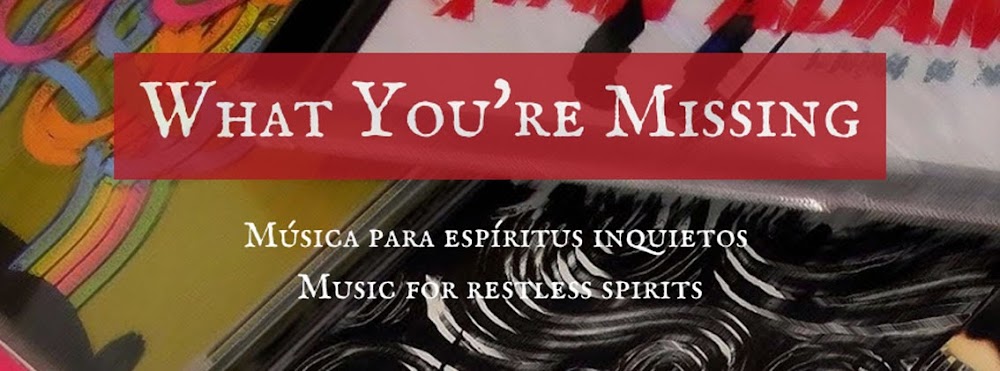LXVI
"Y me gustaría creer que ahora no voy a dejar más cabos sueltos"
CABOS SUELTOS
Amigos Imaginarios
Muñecas Rusas
Rock Indiana
Rock Indiana
2010
(ENGLISH AFTER THE JUMP) Pocas veces una canción me ha retratado de forma tan flagrante como si de un espejo se tratara. No es un retrato modélico de comportamiento, sino más bien de un ejemplo de la imperfección humana, que a todos nos atañe. Nadie está orgulloso de sus imperfecciones, pero con los años uno aprende a aceptarlas sin preocuparse ya demasiado por ellas. A veces hasta las negamos, otras nos prometemos a nosotros mismos que las eliminaremos. Y es este último caso el que nos ocupa. Santi Campos, la cabeza de los Amigos Imaginarios, nos describe una de esas situaciones, que a mí me define perfectamente: dejar las cosas a la mitad. Desde un libro hasta el proyecto más ambicioso, ese que sólo está en tu cabeza y nunca le has contado a nadie. Y mira que me jode, pero no sé si conseguiré "mantenerme atento" y acabar las cosas, como canta Santi.
Llevamos toda la vida escuchando cómo hemos de actuar ante la vida, por eso creo que debe haber algo dentro de nosotros que nos hace reaccionar bien tal y como nos mandan, bien de forma totalmente contraria o más bien nos hace quedarnos en algún lugar a mitad de camino entre ambas opciones. Ese algo imperfecto, raro, incluso retorcido dentro de nosotros no se quiere ir aunque se lo pidamos de rodillas, porque sabemos que nos hace mal. Pero ocurre que en el fondo, pese a la plegaria del estribillo que tantas veces todos nos hemos cantado, estamos poco convencidos de esa promesa de cambio, porque sabemos demasiado bien que deshacernos de esa imperfección significa dejar de ser nosotros mismos. Y eso no.
Otra de esas maravillas de Muñecas Rusas que nos muestran otro trocito de nosotros mismos es Un poco más feliz. Otra declaración de principios que seguro le va a alguien como anillo al dedo. ¿Estamos o no delante de uno de los mejores letristas de España?
Otra de esas maravillas de Muñecas Rusas que nos muestran otro trocito de nosotros mismos es Un poco más feliz. Otra declaración de principios que seguro le va a alguien como anillo al dedo. ¿Estamos o no delante de uno de los mejores letristas de España?
A Santi lo encontré por el ciberespacio mientras buscábamos un tema cuya letra pudiera explicar la historia que contábamos en nuestro documental Ecuapop. Y dimos con Permanecer. Otra joya de canción que parecía escrita expresamente para el protagonista del mismo. Coincidiendo con una actuación en Castellón, fuimos a pedirle el consabido permiso para usar el tema. Aún no habíamos acabado de explicarle el proyecto cuando ya obtuvimos un "por supuesto que sí" rotundo con una sonrisa en la boca. Este amigo no tiene nada de imaginario, pensé. Ahora ya no me lo encuentro por casualidad. Ahora lo busco y me regala una canción que de nuevo parece hecha expresamente para mí. Así lo siento y así se lo dije tras su flashconcert en Castellón para nomepierdoniuna.net. Allí tocó Cabos sueltos y allí le prometí que haría esta entrada. Es de recibo no dejar la promesa sin cumplir. ¿Estaré empezando a cambiar?
To begin with, very rarely have I come across a song that so blatantly depicts my innermost being. It is not a model portrait of behaviour, it is just one of an imperfect human being, as all of us are. Nobody is proud of his imperfections, but through the years we somehow learn to accept ourselves without worrying too much about them. Sometimes we even deny them, sometimes we promise ourselves we'll stop being so. And the latter is the case we're dealing with. Santi Campos, the leader of Amigos Imaginarios, describes a series of situations where he feels there are too many loose ends: books halfway read, abandonned friends, words only spoken when they're useless, and so on. The chorus is a prayer where the singer uses the conditional -'I would like to believe that I ain't gonna leave any more loose ends'- just to show his little conviction of the possibility of change. I would also love to believe we can easily change the ways we face life. We have been told how to behave, react and proceed since the day we were born and I want to believe that there is something inside us that makes us do either as we're told, the opposite way or something inbetween. And that something seems to want to stay inside us although we pray to it to go away. In the end, I guess we really don't want to lose it, because it is part of us.
I met Santi while searching for a song with a message as close as possible as the one we were working on in our documentary Ecuapop. We came across the beautiful Permanecer, and it really was as if he had written it on demand. We talked to him before a show in Castellón and he gave us permission to use it even before we had finished explaining what it was for. 'This is no imaginary friend', I thought. Now, I don't come across him any longer, I go searching for him instead. As a reward, I am given a song that, again, seems like it's been written for me. I could talk to him after his flashconcert in Castellón for nomepierdoniuna.net, where he played Cabos sueltos, and I promised I would write this post. It seems to me I shouldn't be leaving this loose end. Does this mean I am starting to change?
Enlaces/Links:
Página web de Amigos Imaginarios: amigosimaginarios.es
Amigos Imaginarios at Myspace, Facebook
Descarga libre/Free Download: amigosimaginarios.bandcamp.com
Descarga libre/Free Download: amigosimaginarios.bandcamp.com




